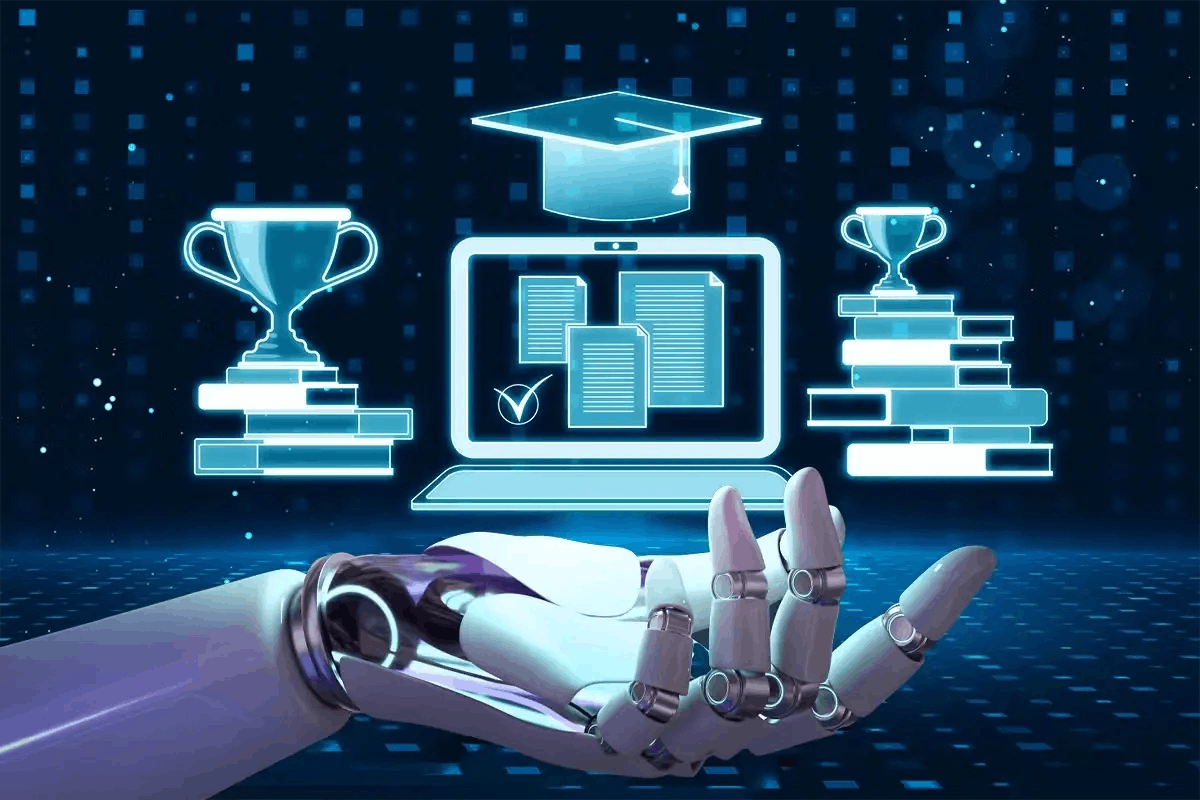


Traditional grading systems have always been the focal point of educational assessment. They greatly depend on teachers, making them conduct the process of grading, evaluating, and scoring students' work on their own. Although this method is effective in some situations, it has some issues associated with it. For example, time-consuming, being a matter of judgment, and even the possibility of different human errors. These limitations may result in disparities in grading, thus making it difficult to set fairness and objectivity.
Artificial Intelligence (AI) in grading has made its way into education becoming a catalyst for significant improvement and positive change. Specifically, learning through AI stands to change assessment practices in general aiming for higher accuracy and improvement in critical areas like consistency and quality of feedback for each learner.
Artificial Intelligence in the field of grading is basically about the usage of AI-based systems for the evaluation of students’ works like written submissions, assignments, and examinations, among others. It replaces the manual and tedious grading tasks done by teachers and lecturers in the education field. These systems can grade assignments like essays as well as tests. They acquire the knowledge to do so from large amounts of data that include real-life examples of how human teachers grade various assignments given to their students.

The process of grading has gone through several alterations over the years. Back in the initial phase, teachers had to manually grade assignments by hand. After that, grading elements became much simpler due to the implementation of digital tools, and yet the teachers were still the ones who had to do most of the work. Today, AI can relieve the teachers of a substantial part of the grading work and thus grading becomes faster and more accurate.
Machine learning is the way one teaches systems to recognize a pattern and make decisions based on data. In education, it implies the process of shaping an AI model to understand students' responses and grade them on the basis of predetermined criteria. The NLP application is also helpful for the proposed AI tool to identify the right meaning of expressions and to check the grammatical correctness of a given text.

For instance, Natural Language Processing (NLP) enables AI to find out the context and the actual meaning of students' written responses. Thus, AI is now able to evaluate the text of the essay based on the presented arguments, the appropriateness of vocabulary, and the extent to which the idea is kept consistent. Machine learning algorithms are fed with new data that are periodically updated, which makes them more precise and reliable over a period of time.
Let us now find out the various benefits associated with AI in grading.
AI in grading has several benefits, with speed being the main one. A teacher usually takes more than an hour to grade the essays of the entire class while an AI system can grade hundreds of them in minutes. Hence, these students receive the scores and feedback much sooner, which greatly contributes to their quick learning.

One of the recent studies found that AI grading can cut marking time by 80%. This quick feedback saves time and also benefits the students to get feedback early. AI has sped up the processing and evaluation of the student's work at the same level as humans. Therefore, students can get a significant advantage in receiving feedback from their teachers in just a few hours or minutes which in turn is very useful for learning and progress.
Also, automated grading systems can boost the speed of marking significantly; therefore, AI grading can be extra helpful during crunch times. For example, at the end of the semester when teachers have a lot of grading tasks to do, often they are overwhelmed. AI can easily cope with the lion's share of the work, letting the teachers concentrate on the most important parts of the educational process, for instance, planning of lessons and helping students.
AI grading can clear human biases from the grading process. The AI system provides the same rules in the evaluation process, guaranteeing fair and consistent grades in every assignment. This is an essential element for creating equity in education.
Let's say human graders, who on a standardized test may form opinions or recall their personal experiences, would conduct the scoring. However, AI is programmed to assign scores based on specific criteria, thus ensuring that all students are graded in the same way.
Bias in grading occurs via many paths, for example, a grader's mood, fatigue, or unconscious biases about a student's handwriting, ethnicity, or gender. The AI removes these disparities by giving unbiased evaluations dependent solely on the content of the student's assignments. Thus promoting global equality by identifying and giving opportunities to the students based on their performances rather than making it a subjective issue.
Artificial Intelligence has the capacity to produce in-depth and personal assessments for each student. This makes sure that students recognize the points they did well in and the areas they need to reflect on. Offering such personalized feedback demands a lot of time and effort to be undertaken, particularly with big classes to teach.
For example, Turnitin, an AI-based tool, not only checks for plagiarism but also gives detailed comments on writing. The program picks up on grammar errors, lack of coherence, and improper structure, which are crucial to further students' writing skills improvement.
Personalized feedback with AI is the most important contribution to learning, as the students can realize their strengths and weaknesses. AI systems can give feedback on some particular aspects, for example, language, reasoning, and argument structure, making students get the proper direction to improve. Such type of feedback is likely to be more comprehensive and impactful than the one a teacher can give, especially when the size of the class is very big.
This grading technology can simplify the assessment process with AI in e-learning environments. Some AI-powered grading tools take over grading which provides teachers the flexibility to engage in the teaching process and interact with students.
The advantage of reducing teachers' loads in practice is that they can look after their health and avoid the possibility of burnout. Utilizing the automation of repetitive works, e.g. grading, teachers can spend a lot of time working on creative lessons, research projects, or individualizing learning aids to students.
Read more: AI Grading Development Process and Considerations
There is a process behind how AI does analysis and grading on behalf of teachers. Let us explore the step-by-step approach followed by AI.
AI grading systems need a lot of data to work well. This data includes the assignments of past students, the grading system, and feedback from teachers. AI systems learn from this data to improve their grading accuracy.
For example, the AI grading system can have a large set of essays written by human teachers to get training. Thus, these essays are examined by the system to understand the different aspects involved, from grammar and coherence to quality and depth of analysis.
Artificial intelligence grading systems rely heavily on machine learning algorithms. These types of algorithms analyze the data to recognize the patterns and predict the results. In the grading process, the AI algorithms learn to identify the best features of the good assignments and the worst features of the bad ones by looking at many examples. The AI system also becomes more accurate in grading new assignments as time goes by.
For example, a machine learning algorithm could go through the scores of thousands of essay papers and see which features are associated with different grades. When the algorithm is looking at more and more data, it is enhanced to make an accurate prediction about the grade of each essay.
AI assesses essays by measuring things like grammar, coherence, and relevance. Some research reveals that AI can grade essays as accurately as humans. Nevertheless, human control is inevitably needed to ensure that the artificial grading is on the right track of the educational objectives.
The research conducted by the University of Akron found that most of the time AI and human graders were in agreement with the AI essay scores. This is proof that AI in Education can be a good grader. However, the involvement of a human in evaluation is also needed to catch any mistakes or nuances the AI might miss.
AI does extremely well in assessing multiple-choice and other objective examinations in which there are clear-cut answers. AI multiple-choice grading is already widely used for this purpose in many schools because it is fast and reliable. A case in point would be the Educational Testing Service (ETS) which uses AI to grade the multiple-choice sections of the GRE. The AI evaluates thousands of responses in a short period with a high precision rate, which means that the results are fair and even across the examinees. Such swiftness is no doubt advantageous for large-scale tests.
AI's capability to grade objective assessments at a faster pace and with an incredibly high degree of accuracy is one of the most important contributions it has made to the field of standardized testing. Thereby, it guarantees that all students receive marks based on the same standards and in that way eliminates the possibility of a teacher's mistake or bias. In turn, this uniformity is necessary to keep the credibility of standardized tests.
AI assesses written answers through complicated Artificial intelligence grading algorithms where the most significant ones are Natural Language Processing (NLP) and Machine Learning (ML). NLP facilitates AI to make sense of and convey what humans are trying to express, by recognizing sentence structure, grammar, and other elements used.
ML algorithms help AI grow by accessing the large dataset of graded responses. Over a period of time, AI can notice the best writer`s responses by finding out the logical sequences and the most error-prone ways to approach the task.
AI and human grading have the same ultimate goal of accurate and swift assessment but they are different in many ways. AI technology can check a great number of papers in a very short time and, thus, allows students to receive timely feedback. However, human graders are not this fast and suffer from the backlogs. AI can, for instance, ensure absolute objectivity in evaluation via the set criteria that are applied to all the responses. Furthermore, it minimizes biases and, therefore, leads to fair evaluations of students. Whereas, individuals can still involve subjective elements due to tiredness, bad mood, etc., which can eventually cause grading inconsistencies.
AI does so well in the grading of various assessments owing to its unique capacity to check correct answers in the fastest possible way and with utmost precision. AI's grading system is designed to compare students' responses to the standard answers and thus, it ensures immediate and error-free grading. AI can connect the dots in different ways thus providing teachers with insights into specific weak areas, the areas that many students are confused about, or the parts that are still not clear.
AI is a technology that is capable of grading tests and objective tests automatically and with great precision and efficiency. AI makes sure all the exams are graded in the same way, eliminating any possibility of bias and human error. AI systems can, in a matter of seconds, grade thousands of tests, making them perfect for the case of standardized exams that involve a large number of participants. Also, AI enables swift grading allowing students and educators to get instant results and feedback which definitely is a good thing, especially in adaptive testing where the questions are determined by the previous answers.
AI is well known for its precision in grading multiple-choice and objective assessments with only a very small number of errors. AI functions with great precision by matching teacher-assigned answer keys with corresponding student responses. Thus, errors associated with manual grading are solved. Based on the tendency of mistakes, the AI can inform teachers about the weaknesses of students and the learning activities that need to be conducted during a lesson.

The future of AI-based grading is looking bright and impactful with the continuous development of various AI-infused tools and systems.
New technologies as well as AI advancements are expected to change the grading process to a greater extent. Technologies such as deep learning and advanced NLP will make AI grading more accurate and capable of evaluating complex student work.
Deep learning, a type of machine learning, teaches neural networks to detect patterns from given data. With grading, deep learning algorithms can analyze many worksheets to discover hidden patterns and things unnoticeable by humans. This technology can improve the accuracy and reliability of AI grading systems.
Furthermore, advanced NLP methodologies will guarantee AI's competence to scrutinize written responses. AI, being able to comprehend the context and message conveyed in students' responses, can give more precise and constructive feedback. This will enable learners to acquire critical thinking and writing skills.
Predictions for the Next Decade In the next decade, AI in Edtech may be a standardized part of the educational system. AI grading systems will be used in classrooms, online courses, and blended learning environments. These systems will improve further, providing students with more personalized and useful feedback.
AI will become a significant part of the implementation of personalized education. This will help to a large extent students receive the support they require to accomplish their goals, no matter where they start.
AI grading systems will add to Learning Management Systems (LMS) and other educational tools, thus facilitating easy interaction with them. This integration will result in a connected educational environment so that learners have a single data store to access from different programs, and it will also improve their learning process.
For one, LMSs like Blackboard and Canvas could be coupled with AI grading systems. Under this scheme, tutors can easily coordinate all aspects of their classes through a single platform, thereby decreasing administrative tasks and enhancing the output. Through AI-facilitated data analysis, educators can also get useful insights on the performance of students which in turn helps them make informed decisions.
The impact of AI in grading can be immense, especially in the parts of the world where many do not have good quality education. AI technology is capable of providing the same level of assessments and the same standards of quality, no matter who the student is. This can help close the education gap and boost learning outcomes all over the world.
In developing poor countries, AI can be the door that leads to much-needed teaching from certified teachers and educational resources. AI grading systems are effective in terms of equity and justice, as every student gets to have the same chance to succeed no matter the location he/she is in. This can help bring about better educational results and open the doors for the students who are from areas that are not in the mainstream.
AI is changing the assessment process with a broad range of initiatives. Besides, the efficiency and quality of education have improved while freeing up teachers to concentrate on their main tasks, teaching, and mentoring. In light of the growing expansion of AI technology, every student will have the possibility of individual assistance and support which are necessary for their success.
Codiste is one of the best AI development companies focusing on educational technology and AI. We use high-tech AI algorithms and tools to make the process of learning more effective for students and more manageable for educators. Our AI-based assessment technology provides less time-consuming precise tools. Codiste is the leader in the development of the solutions that are needed for the education sector to keep up with new trends.




Every great partnership begins with a conversation. Whether you’re exploring possibilities or ready to scale, our team of specialists will help you navigate the journey.